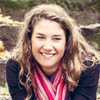Author: Emily Long, Pennsylvania College of Health Sciences
As a diagnostic medical sonography student, you are probably starting to explore the job market in effort to secure employment upon graduation. This, of course, is not a unique circumstance. Every year thousands of students in all sorts of academic programs are concerned about landing their first job.
Facing the professional world and entering the work force can be intimidating. Not to mention the stress of competing with so many other new graduates. How can you stand out from the other sonographers who possess the same degree and knowledge as you? Fear not! There are several practical ways you can start building your resume while still attending a diagnostic medical sonography program.
Volunteer in a Health Care Facility

This may seem like an obvious suggestion, but many students have difficulty finding the time for volunteer work in the midst of classes, tests, and clinicals. That’s okay. You don’t need to volunteer during the semester if you feel it would put you behind in your schoolwork. Students in the health sciences are strongly encouraged to seek out relevant volunteer opportunities during semester breaks. Volunteering in a hospital or private practice during the summer can give you real world health care
experience, helping your resume to stand out among other job applicants.
Shadow Current Sonographers
Shadowing a diagnostic medical sonographer is another great way to gain insights to the profession while still in school. Though you may not be asked to carry out tasks as you would in a volunteer position or internship, there is plenty to learn by observation. Employers want to see you taking the initiate to enhance your skills and expand your knowledge of the field in which you are seeking employment.
Network, Network, Network

The value of professional networking cannot be overstated. You never know what sort of opportunities could come from a previous connection. Keep in contact with supervisors and other employees you worked with in the past. This doesn’t have to be a weekly phone call, but exchanging the occasional email helps to keep your name top-of-mind when a sonography position becomes available or when you are looking for good references.
Don’t limit yourself to just employers or co-workers either. Mentors and professors can be fantastic relationships to maintain when establishing yourself in the professional world. Remember that sonographer you shadowed last semester? They may not be in charge of hiring new employees, but they could put in a good word for you if a position opens up in their facility.
Use tools like LinkedIn and Email to keep the communication lines open. Remember, if you don’t keep in touch with members of your professional network, they will have no way of knowing you are even looking for a job, much less recommend you for open positions.
Additional Experience
Spending the summer abroad, taking mission trips, or contributing to various campus organizations are all non-professional activities that can add value to your resume. These experiences usually develop at least one quality or skill that is necessary in the working world and should be included in the “experience” portion of your resume. The key is constructing a resume that highlights the value of your unique life experiences. For example, spending an extended amount of time abroad may have provided you with language skills that are beneficial in a health care position.
Personal Interests—Athletic Activities, Art Projects, Cooking, Etc.
Including some personal interests in your resume can help show your personality. Allowing a hiring manager to understand who you are and what you enjoy, lets them better evaluate whether or not you would be a good fit for the company’s culture. Private practice facilities and hospitals need to maintain a team of professionals who not only have the knowledge required to help patients, but who possess the attitude and character to uphold the facility’s values. Feel free to do a little digging on the employer—find out if they support any causes you are passionate about. Perhaps they participate in a local volleyball league. If so, this might be a great opportunity to let them know you make a fantastic middle blocker.
Applying for your first job as a sonographer can seem daunting. But there are lots of great ways to start enhancing your resume before you even graduate. Applying a few of the suggestions discussed here can help you get ahead of the curve.
About Pennsylvania College of Health Sciences
A dynamic and rigorously academic institution, Pennsylvania College of Health Sciences is a private, accredited, four-year college offering associate and baccalaureate degree programs as well as certificate programs. The College’s Diagnostic Medical Sonography placement rate of over 70%.
Article by Emily Long, part of the communications team at Pennsylvania College of Health Sciences in Lancaster, PA. She enjoys writing about current trends in health care and helping students get the information they need to land a job in their desired career field. When she is not writing, Emily loves spending time outdoors, playing the guitar, and riding motorcycles.

Candice Sellers, B.S., RDMS – Contributor Students attending ultrasound school consistently report that ultrasound physics is one of the most difficult courses in their program. It’s a required course and one that is important to master. Below you will find study tips and tools available to students to help them focus and hone in on…
How I Mastered Ultrasound Physics
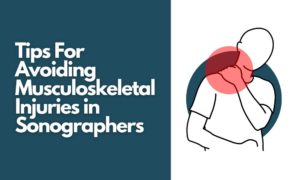
By Adrienne Hardy, RDMS (Ab, Ob/Gyn) – Contributor According to the SDMS, 90% of sonographers will sustain a work related musculoskeletal disorder; 20% will have a career ended because of the injury. With numbers this high it seems like it’s an inescapable truth that you must scan in pain or get injured at some point…
Most Common Injuries in Sonographers

By Adrienne Hardy, RDMS (Ab, Ob/Gyn) – Contributor As I sat in my entrance interview for sonography school the professors spattered me with questions: “Do you have enough savings? What is your home like? How do you manage your time? Do you have someone who cares about your success and will support you in hard…
Surviving and Thriving in Sonography School

We recently had the pleasure of speaking with Carlos Reveles, a high risk Ob/Gyn sonographer. In this interview, Carlos shares with us what led to him being recently recognized as a standout sonographer by his employer, and what it’s like being a male in a traditionally female field. Welcome Carlos! Hello my Name is Carlos…
Explore Carlos’s Sonography Journey

Adrienne Hardy, RDMS (Ab, Ob/Gyn) – Contributor I clicked submit on the SPI physics exam and ran out the the room. The test proctor handed me a piece of paper with a huge scared looking picture of myself taken before the exam, my ARDMS number and the results of my SPI examination. My hand shook as…
Passing the Sonography Principles and Instrumentation Exam

Candice Sellers, B.S., RDMS – Contributor The Ultrasound School Experience Ultrasound school is a very exciting and rewarding experience. The excitement of finally reaching your goal of getting accepted into an accredited ultrasound program is certainly a tremendous milestone! However, there will be moments of frustration and stress that will occur during your journey in…
How I Managed Stress While in My Sonography Program
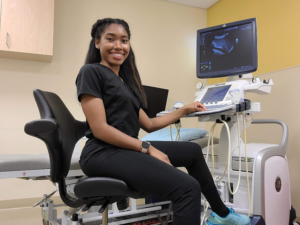
DruAusten Fields, RDMS (AB, OB/GYN), RVT – Contributor The Skilled Sonographer, DruAusten Fields, RDMS (AB, OB/GYN), RVT looks back on the development of her SPI test prep mini-course, and her work to help others pass their SPI exam. When I look back on where I started versus where I am, I can confidently say I have…
Tap into Dru’s Diagnostic Imaging Expertise
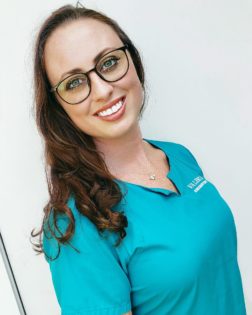
Adrienne Hardy, RDMS (Ab, Ob/Gyn) – Contributor What to expect as you transition from DMS student to the medical imaging workplace. Congratulations! You ran the marathon of Sonography school and now have gotten a job! What a relief, right? All the pent up anxiety and pressure of ultrasound school feels let off like a pressure valve…
Surviving the Transition: From Student to Sonographer Pro!
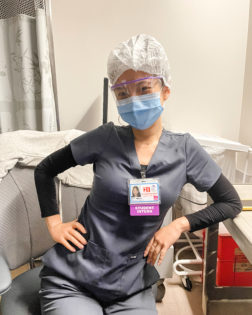
Lynn Nguyen – Sonography Student & Contributor Join Lynn on her journey as she pursues a 2nd career as a sonographer. Why Sonography? How Did I Get Here? I have never given sonography a thought much less loving the thought that I am going to be a sonographer one day. In high school I knew…
Why I Chose Diagnostic Medical Sonography
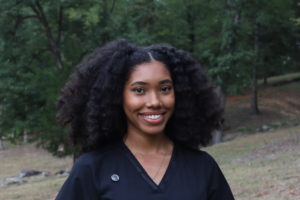
DruAusten Fields, RDMS (AB, OB/GYN), RVT – Contributor The Skilled Sonographer, DruAusten Fields, RDMS (AB, OB/GYN), RVT shares her sonography story! From Indecision to Decision Deciding on a lifelong career can be stressful, especially at a young age. During high school was when I began toying with the idea of pursuing a career in the…
Systems for Success in Sonography

Sam Callis, contributor at USI, is an author and sonographer with experience in multi-specialty clinical practice, higher education, and the medical device industry. She is the author of Diagnostic Medical Sonography – The Definitive Guide to Planning Your Career. We were first introduced to Samantha back in 2019 with this terrific interview in which she…
From Art to Science: A Sonographer’s Unique Career Path
The demand for healthcare professionals, including those specializing in medical imaging, continues to rise. As the aging baby boomer population grows, there is an increasing need for diagnostic imaging procedures, alongside a demand for new providers to fill positions vacated by retiring workers. This ongoing expansion in medical imaging careers presents excellent opportunities for individuals…
Updated for 2025




